Business Law In Canada 11th Edition By Yates – Test Bank
Chapter 11 Corporations
1) Which of the following is true with regard to the characteristics of corporations?
A) The corporation is a separate legal person, but can neither sue nor be sued.
B) Directors are responsible for the shareholders of the corporation.
C) Shareholders are liable for the debts and other obligations of the corporation.
D) A shareholder’s liability is limited to the amount he or she paid for the shares.
E) The shareholders would be vicariously liable for any damage caused by an employee of the corporation carrying out his or her duties.
Answer: D
Diff: 2 Type: MC Page Ref: 345
Topic: Ch. 11 – Separate Legal Entity
Skill: Recall
Objective: Chapter 11: 1. Analyze the separate legal entity principle.
Bloom’s Taxonomy: Knowledge
2) Jack Kihn incorporated and put $20,000 into the corporation by way of a shareholder’s loan and took back a Security Agreement on the corporation’s equipment. The corporation created decorative boxes. An employee of the company delivered some boxes to a customer who complained about the colour used. The employee became so angry that he shoved the customer, who fell into a glass display case, causing $30,000 damage to the customer and the case. On these facts, which of the following is false?
A) The employee is liable for the tort of battery.
B) The employee is liable for his tort and his employer is also liable.
C) Kihn himself is vicariously liable for the damage caused by the employee.
D) If the corporation went bankrupt, Kihn himself would be a secured creditor.
E) Although Kihn is the sole shareholder of the corporation, he is not responsible for company debts.
Answer: C
Diff: 2 Type: MC Page Ref: 345
Topic: Ch. 11 – Separate Legal Entity
Skill: Applied
Objective: Chapter 11: 1. Analyze the separate legal entity principle.
Bloom’s Taxonomy: Knowledge
3) A real estate agent, by virtue of his fiduciary duty to his principal, is not allowed to buy the property being sold by his principal without full disclosure to and consent from his principal. The real estate agent does not want to disclose that he is the buyer of the property, so he forms a corporation and takes an offer to his principal from the corporation. Based on these facts, which of the following is true if the principal finds out the corporation/buyer is owned by the real estate agent and objects to the contract?
A) The court would enforce the contract because the corporation is a separate legal entity in the eyes of the law.
B) The court would enforce the contract because this is not a direct breach of the agent’s fiduciary duty.
C) The court would not enforce the contract and would “lift the corporate veil.”
D) The court would dissolve the corporation.
E) The court would enforce the contract, but the principal would be able to claim any profits from the agent when he took them out of the corporation.
Answer: C
Diff: 1 Type: MC Page Ref: 345
Topic: Ch. 11 – Separate Legal Entity
Skill: Recall
Objective: Chapter 11: 1. Analyze the separate legal entity principle.
Bloom’s Taxonomy: Knowledge
4) In Salomon v. Salomon & Co., Mr. Salomon incorporated a business to which he loaned money, secured by a mortgage on the business assets. When the business failed, the creditors turned to Mr. Salomon, arguing that he should not be able to claim priority as a secured creditor and, in fact, should be responsible for the company’s debts. What did the Court find?
A) Mr. Salomon, as the incorporator, should be responsible for paying the creditors of his business, on the grounds of unjust enrichment.
B) Mr. Salomon could not claim priority as a secured creditor, because this would amount to a conflict of interest.
C) The company was a legal entity separate from Mr. Salomon, so Mr. Salomon could have priority as a secured creditor and bore no responsibility for the company’s debts.
D) The company was a legal entity separate from Mr. Salomon, but it would not be fair to allow him to claim his money ahead of arm’s length parties.
E) Mr. Salomon, by creating a fictionalized legal entity, had committed a fraud on the business’ creditors, and so should bear total responsibility for the creditors’ claims.
Answer: C
Diff: 2 Type: MC Page Ref: 345
Topic: Ch. 11 – Separate Legal Entity
Skill: Recall
Objective: Chapter 11: 1. Analyze the separate legal entity principle.
Bloom’s Taxonomy: Knowledge
5) Four years ago, Ben Ratzi incorporated a corporation and became the sole shareholder, director, and officer. He lent the corporation $10,000 and took a General Security Agreement from the corporation as security for repayment of the loan. The corporation prospered. Last year, your brother began supplying the corporation with office supplies. He was paid at the end of each month for supplies delivered during that month. For the last six months, however, he has not been paid. He learned that other suppliers had not been paid either because sales dropped drastically, apparently due to Ratzi’s harsh management style, which upset the entire staff. Which of the following is true?
A) If your brother decided to sue for the debt, he could sue Ratzi because he was the sole shareholder and his management style caused all the trouble.
B) Your brother could take an action under statutory “relief from oppression” provisions.
C) If Ratzi dies, his corporation would automatically die too, and there wouldn’t be any person to sue.
D) If this corporation were placed into bankruptcy, Ratzi would be in a better position than your brother for receiving proceeds realized from the sale of the assets of the corporation.
E) Your brother has no claim against the corporation because it has limited liability.
Answer: D
Diff: 3 Type: MC Page Ref: 345
Topic: Ch. 11 – Separate Legal Entity
Skill: Applied
Objective: Chapter 11: 1. Analyze the separate legal entity principle.
Bloom’s Taxonomy: Knowledge
6) Which of the following is an advantage of incorporation?
A) Shareholders are liable for debts of the corporation.
B) There are no tax advantages as compared to a sole proprietorship.
C) Shareholders can veto decisions of directors.
D) Shares are easily transferred.
E) Shareholders owe a duty to the corporation.
Answer: D
Diff: 2 Type: MC Page Ref: 348
Topic: Ch. 11 – Pros and Cons of Incorporation
Skill: Recall
Objective: Chapter 11: 2. Describe the advantages and disadvantages of incorporation.
Bloom’s Taxonomy: Knowledge
7) Which of the following is not an advantage of incorporation?
A) Shareholders are not liable for debts of the corporation.
B) There may be tax advantages.
C) Shareholders can veto decisions of directors.
D) Shares are easily transferred.
E) Shareholders owe no duty to the corporation.
Answer: C
Diff: 2 Type: MC Page Ref: 348
Topic: Ch. 11 – Pros and Cons of Incorporation
Skill: Recall
Objective: Chapter 11: 2. Describe the advantages and disadvantages of incorporation.
Bloom’s Taxonomy: Knowledge
8) When lending money to a closely held corporation, what will a bank usually insist on from the major shareholders or other principals?
A) a debenture
B) a negotiable instrument
C) a fiduciary obligation
D) a pre-emptive right
E) a personal guarantee
Answer: E
Diff: 1 Type: MC Page Ref: 348
Topic: Ch. 11 – Pros and Cons of Incorporation
Skill: Recall
Objective: Chapter 11: 2. Describe the advantages and disadvantages of incorporation.
Bloom’s Taxonomy: Knowledge
9) Mark wants to incorporate. Which one of the following statements is correct with regard to incorporating in Nova Scotia?
A) Articles of incorporation is the document used to incorporate the company.
B) These are “letters patent” jurisdictions.
C) The documents to be sent to the registrar of companies are called the “memorandum” and the “articles.”
D) The “objects” of the company must be set out in the charter document so that the shareholders understand the limits on the capacity of the corporation.
E) You can’t incorporate a closely held company in this jurisdictions.
Answer: C
Diff: 2 Type: MC Page Ref: 352
Topic: Ch. 11 – The Process of Incorporation
Skill: Recall
Objective: Chapter 11: 3. Describe the process of incorporation.
Bloom’s Taxonomy: Knowledge
10) You have been asked by two fellow graduates to join them in incorporating a closely held corporation that would commence a consulting business. One was in your class, so you know him quite well, but the other is graduating from a different school. You have been discussing the law to review the protection it gives you. Read each of the following statements separately and indicate which is false.
A) As a shareholder, you will have the right to vote for the directors, who in turn will choose the officers.
B) A shareholder’s agreement would lessen any misunderstandings about rights and obligations.
C) If you each take one-third of the first allotment of the shares, you will necessarily be a minority shareholder.
D) If you have pre-emptive rights and the directors decide to issue a new allotment of shares, the corporation must offer you a portion of the new issue to allow you to keep your proportional share of the corporation.
E) If you were voted out as a director by the others, who could show that it was in the best interests of the corporation, you could always sell your shares to any interested buyer without interference from the other directors.
Answer: E
Diff: 2 Type: MC Page Ref: 356
Topic: Ch. 11 – Funding
Skill: Applied
Objective: Chapter 11: 4. Discuss the funding of a corporation.
Bloom’s Taxonomy: Knowledge


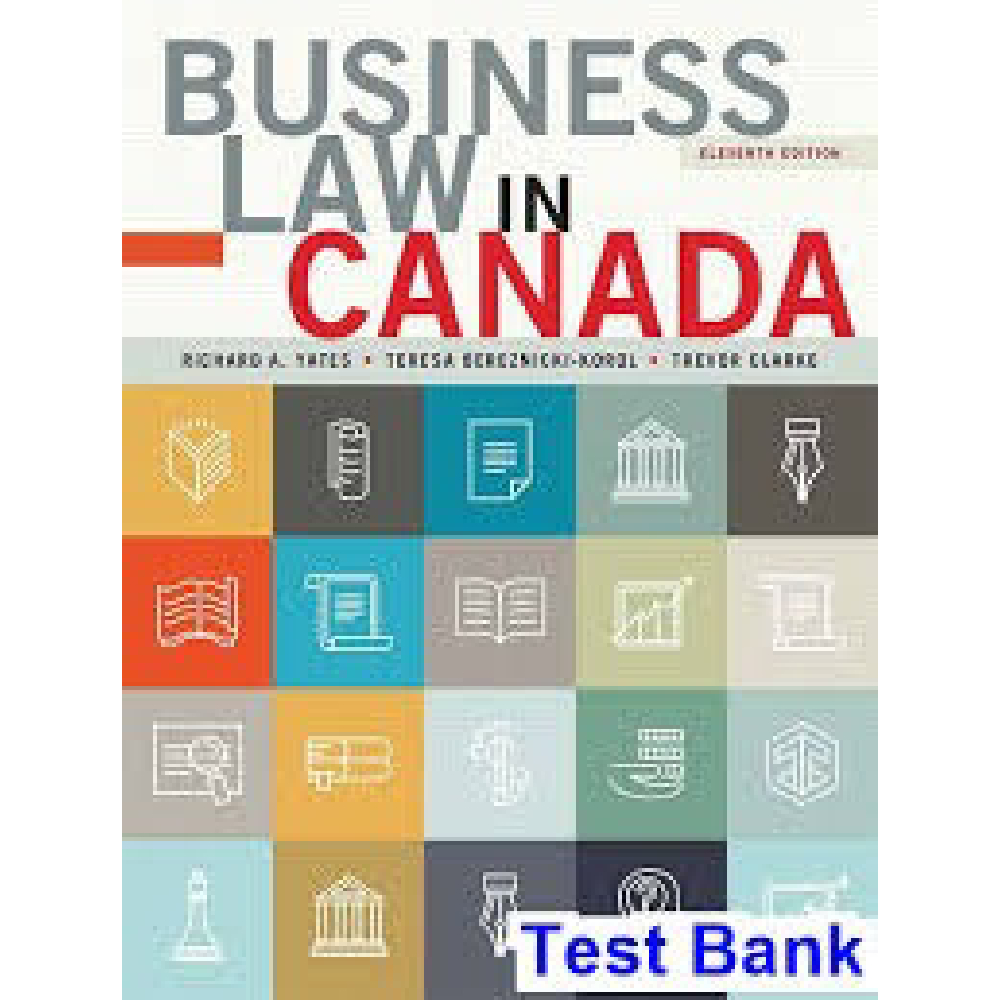


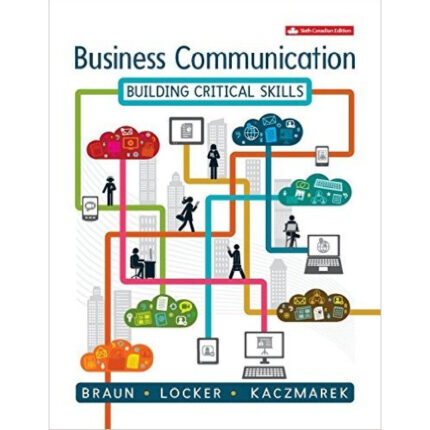

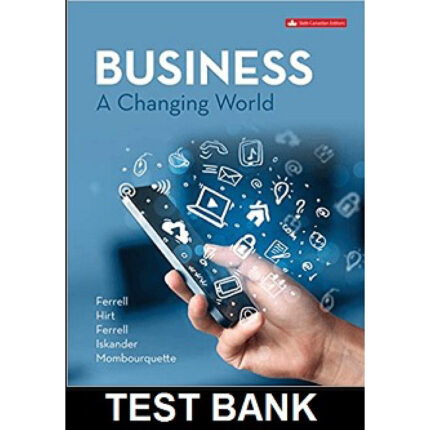

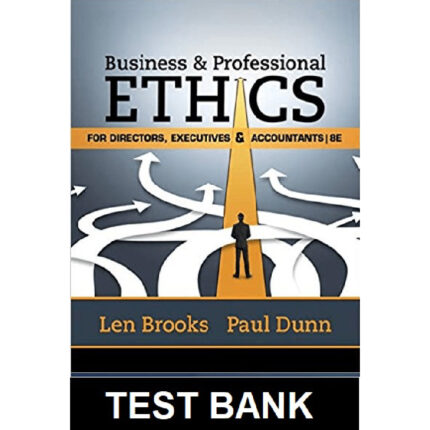
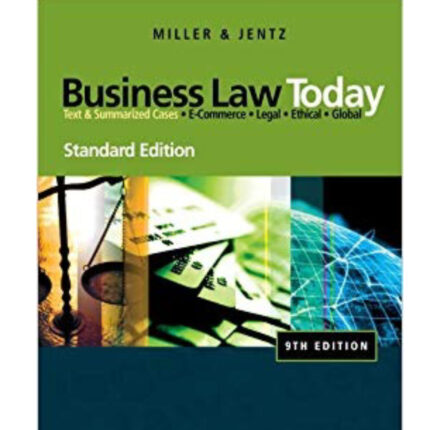


Reviews
There are no reviews yet.